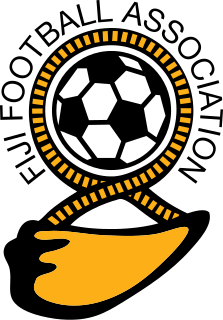
The Fiji Labour Party (FLP) is a political party in Fiji. Most of its support is from the Indo-Fijian community, although it is officially multiracial and its first leader was an indigenous Fijian, Dr. Timoci Bavadra. The party has been elected to power twice, with Timoci Bavadra and Mahendra Chaudhry becoming prime minister in 1987 and 1999 respectively. On both occasions, the resulting government was rapidly overthrown by a coup.

The United Fiji Party was a political party in Fiji. It was founded in 2001 by Prime Minister Laisenia Qarase as a power base; it absorbed most of the Christian Democratic Alliance and other conservative groups, and its endorsement by the Great Council of Chiefs (Bose Levu Vakaturaga) caused it to be widely seen as the successor to the Alliance Party, the former ruling party that had dominated Fijian politics from the 1960s to the 1980s. It draws its support mainly from indigenous Fijiians.

The National Federation Party is a Fijian political party founded by A.D. Patel in November 1968, as a merger of the Federation Party and the National Democratic Party. Though it claimed to represent all Fiji Islanders, it was supported, in practice, almost exclusively by Indo-Fijians whose ancestors had come to Fiji, mostly as indentured labourers, between 1879 and 1916. However, in the 2018 General elections the party recorded a considerable change in its support base as a consequent of the inclusion of more indigenous Fijian candidates.

The Sugar City Ratepayers Alliance (SCRA) was a Fijian political party that operated only on the municipal level, in the city of Lautoka. It was founded early in 2005 with a view to contesting the municipal elections to the Lautoka City Council, scheduled for 22 October 2005. It failed to win any seats, however, either in the main election, or in the special election on 12 November for four seats in the Simla ward, which had been postponed.
Captain Ratu Peni Volavola is a former Lord Mayor of the Fijian capital of Suva.
The Suva City Council is the municipal law-making body of the city of Suva, Fiji's capital. It consists oy f 20 Councillors, elected for three-year terms from four multi-member constituencies called wards. Councillors, who are elected by residents, landowners, and representatives of corporations owning or occupying ratable property in Suva, elect a Lord Mayor and Deputy Lord Mayor from among their own members; they serve one-year terms and are eligible for reelection. Since the dismissal of the councillors by the interim military government the City Council is run by a Special Administrator appointed by the Ministry of Local Government.

Local elections were held in Fiji in October 2002. The results allowed the three major political parties, Soqosoqo Duavata ni Lewenivanua (SDL), the Fiji Labour Party (FLP) and the National Federation Party (NFP) to claim a victory of sorts. The elections, which take place every three years, were for two city councils and ten town councils throughout Fiji.

Local elections were held in Fiji on 22 October 2005 to elect the councils of eleven municipalities. In Suva, the elections for the Suva City Council were postponed until 12 November due to the death of two candidates; the death of a candidate in Lautoka also resulted in the postponement of the poll in one of the four wards.

Sigatoka is a town in Fiji. It is found on the island of Viti Levu and is situated at the mouth of the Sigatoka River, after which it is named, some 61 kilometres from Nadi. In Fiji's last census (2007) the population of Sigatoka was at 9,622. Sigatoka is the principal urban centre for the province of Nadroga-Navosa.

Lami, Fiji is an urban area in Rewa Province, Fiji, north-west of Suva. It was formally incorporated as a Town in 1977, and had a population of 20,529 at the most recent census in 2007. The municipal boundaries enclose an area of 680 square kilometers.
Manoa Dobui is a former Fijian politician, who won the Samabula Tamavua Open Constituency in the House of Representatives for the Soqosoqo Duavata ni Lewenivanua (SDL) in the parliamentary election of 2001.

The Fiji Football Association is the governing body of football in Fiji. It came into existence in 1961, replacing the ethnically based Fiji Indian Football Association. The Indian Association was formed in 1938 but football in Fiji had a much humbler beginning.
The Inter-District Championship (IDC) is the most important event in the Fiji Football Association calendar. Teams representing various football playing districts of Fiji have taken part in this annual event every year, except 1987 due to disruptions caused by military coups, since the formation of the Association in 1938. Teams compete for the coveted Lloyd Farebrother Trophy, donated by the first President of the Fiji Football Association, A.S. Farebrother and Lloyd and Company.
Josaia Waqabaca is a Fijian public figure and former political organizer, who turned police informant about the Fiji coup of 2000. Waqabaca was convicted and imprisoned in 2001 for plotting to kidnap the Military Commander, Commodore Frank Bainimarama, in 2000.

Radio Fiji One is an iTaukei (Fijian) language - public service broadcaster in Fiji. The station broadcasts on the 93megahertz and 558 kilohertz to the cities of Suva, Navua, Nausori, Labasa, Savusavu, Nadi, Denarau, Mamanuca and Lautoka. The station also broadcasts on the 92.8 frequency to the towns of Coral Coast and Ba. The station broadcasts on 93.2 megahertz to the town of Tavua, and on 93.4 megahertz to Rakiraki and Nabouwalu.

Viti FM is an iTaukei (Fijian) language - commercial radio station in Fiji. The station broadcasts on the 92 frequency to the cities of Suva, Navua, Nausori, Labasa, Savusavu, Nadi, Denarau, Mamanuca and Lautoka. The station also broadcasts on the 92 frequency to the towns of Coral Coast and Ba. The station broadcasts on 92 megahertz to the town of Tavua, and on 103 megahertz to Rakiraki and Nabouwalu.







